Last weekend we installed our custom quilted carpet design in the master bedroom, and I’m still nluv! And, I will tell you – every morning waking up to our new, soft, killer carpet, designed just for us, has been delightful! Odds are if you’ve taken on a flooring project, after installing the main floor surface, it isn’t quite time to put away all the tools and call it done. Don’t run out of steam yet!
That finishing touch is important to complete the space. You know what I’m talking about… the carpet transitions! Not the most exciting part, but you need to take the time to install them so all your door jams, closets and other flooring connections are smooth when you step on them as well as look complete. You can really ruin a great moment by stubbing your toe on the severe threshold from your lovely new carpet to the hardwoods next to them. Ouch!
Carpet Transitions, Oh my!
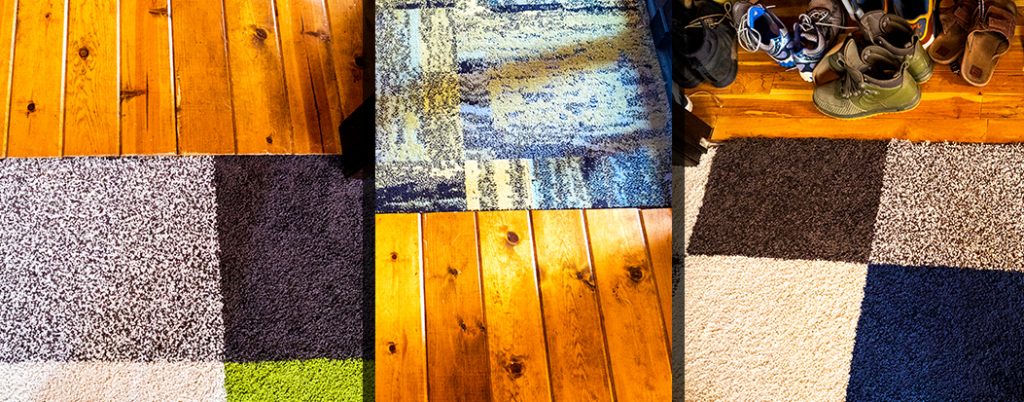
Unfinished thresholds for master door, office landing & master closet
If you’ve looked online or in a store, there are a lot of transitions to pick from. And, I’m not meaning just in materials such as wood, vinyl, or metal but also in types. Do you have a flat transition or maybe plush carpet to hardwood or just a little height difference but not too much? After you get past all the types, the pricing is widely different too. Some are under $10 and others like oak can be upwards of $30 a strip! If you have a lot of places for carpet transitions, that can really add up. Don’t get stressed or overwhelmed. It’s not worth it. You already did all the hard work. This is the easy final piece to bring it all together.
This final step of your flooring glory is simple and best of all, doesn’t have to break the bank! With a couple supplies and a little time, you’ll love the results. Here’s what we did to put the finishing touches on our master bedroom.
Step 1: Mix & Match, who cares!
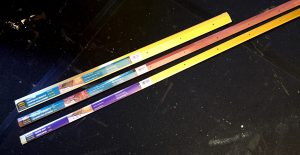
Various transitions will do the job
Standing in the flooring aisle at my local hardware store, I went there with wood transitions in mind. I thought they would look higher quality with the new carpet and the original pine floors at the edges. But as I looked at the prices and the different styles, my mind starting to wander into more creative territory instead of a ‘straight off the shelf option’. Our upstairs needed three carpet transitions and they were all different. This was complicating the process for sure.
What I needed:
- Main master door: 36″ length; 1/2″-3/4″ in. height difference
- Closet: 54.5″ length; 1/4″ in. height difference
- Landing pad to office: 61″ length; no height difference but carpet to wood
All I could imagine was a hodge-podge of materials ruining our brand new floor. I literally threw up my hands in the store and said “Forget matching these. I’ll just buy the right type in the cheapest metal version I can find and I’ll paint them to match the design.” And so I did just that.
What I bought:
- Qty 1 Medium to high carpet transition; metal, wide width, gold color (for main master door)
- Qty 1 Low to medium carpet transition; metal, regular width, faux oak color (for closet)
- Qty 1 Floor seam; metal, regular width, gold color (for landing pad)
- Qty 2 Rust-oleum® Multi-color dark brown textured spray paint
- Qty 1 Minwax® Polycrylic clear semi gloss protective finish
I left the store with one bag, three carpet transitions of various colors and sizes and spent under $40! Time to head home and turn my bag of misfit supplies into well-thought-out design features. A little creative thinking just saved me about $60!
Step 2: Measure & cut to size
Before you break out the saw and start cutting, make sure you carefully measure the thresholds and mark on the transitions so it is clear exactly where you need to cut. Sometimes you will have odd corners at the edges if there is other molding, so I would sketch lines for those on the transitions too so you can cut them all at the same time. Only a few tools are needed to complete the rest of the project. You probably have most in your tool shed or garage already.
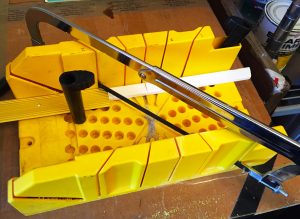
Use molding under transition for easier cutting
Tools:
- Miter box
- Hacksaw with metal cutting blade
- Left over piece of other molding (to help add height in the miter box when cutting transitions)
- Safety glasses
- Sandpaper
- Rubber mallet
- Sponge brush
After measuring and marking the carpet transitions, it’s time to cut. I use a plastic miter box and laid down a remnant piece of molding to help raise up the transition since they are so thin and flat. The hacksaw works great in the miter box and does quick cuts with only a little effort. After cutting all the marked lines, take the transitions back to your room and make sure they fit. If they do, great! Sand the edges and you are ready to move on. If not, make the needed extra cuts or adjustments until they are just right.
Step 3: Scuff ’em up
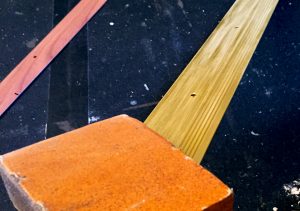
Scuff ’em up for better adhesion
Since the transitions are metal, I took a stiff piece of sandpaper @ 80 grit and scuffed them up. Even though the spray paint is for metal, I always like to create a little extra grip to give the paint the best chance possible for adhesion… especially since these carpet transitions will be on the floor and most likely stepped on! Take a wet rag or paper towel and wipe off any sanding dust. It’s time to move outside to start painting.
Step 4: It’s time to customize
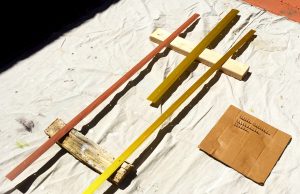
Ready for paint!
Since I’m using spray paint, I set up a drop cloth outside on the deck. I found two pieces of wood to use as blocks to lay the transitions across. The wood risers help when spraying the sides. I don’t want to miss any spots and have the ugly under-colors showing through! If you pick a nice sunny day, the painting process will go much faster. For full coverage, I sprayed three coats of paint, making sure the transitions were dry between each coat. There’s not a hint left of what color they used to be!
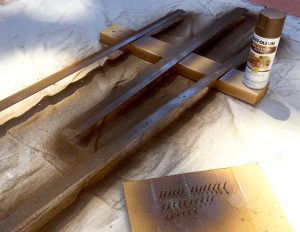
Let fully dry between coats
Don’t forget the nails. Since the carpet transitions are different colors, the nails that came with them are also different colors. To easily paint the nail heads, I stuck them into a piece of cardboard so they stand up on their own. This makes spraying them so quick and easy! If you don’t have any cardboard, anything will work like Styrofoam or even a plastic cup. Poke holes in the cup and stick in the nails. Whatever you find that can hold the nails for you to spray will do the trick.
Step 5: Seal for safety
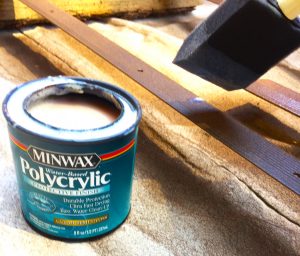
Seal for added durability
Since these carpet transitions are of course going on the floor, I want a little extra safety from chipping and scrapes. After the spray paint is fully dry, I applied a coat of Minwax Polycrylic semi-gloss with a sponge applicator. Not only will this help protect, it also adds a nice shine, accentuating the multi-color spray paint. Don’t forget to dab the nails too! After applying and allowing a little dry time, it’s time to move inside for overnight drying. I moved the finished carpet transitions into my studio and rested them across a step stool to dry.
Step 6: Install & enjoy!
After the Polycrylic is fully dry, its time to install. Lineup the transitions and make sure your nails will go into the right surface. I didn’t want to nail into the adjoining pine boards so I made sure the transitions were positioned so the nails drove into the carpet and subfloor instead. Since you painted the nail heads, be careful when hammering them in or you’ll tear off the new paint! I used a paper towel over the nails and a rubber mallet to be extra safe. That’s it – You’re done!
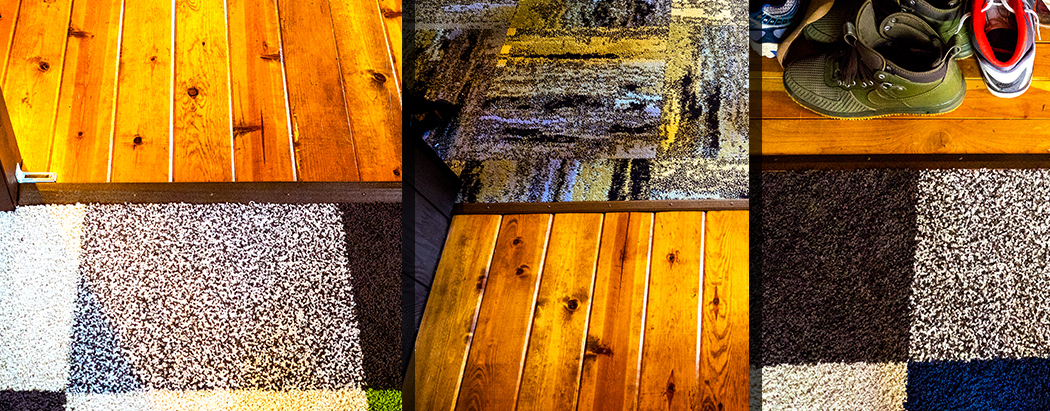
Carpet transitions are the finishing touch!

One Comment